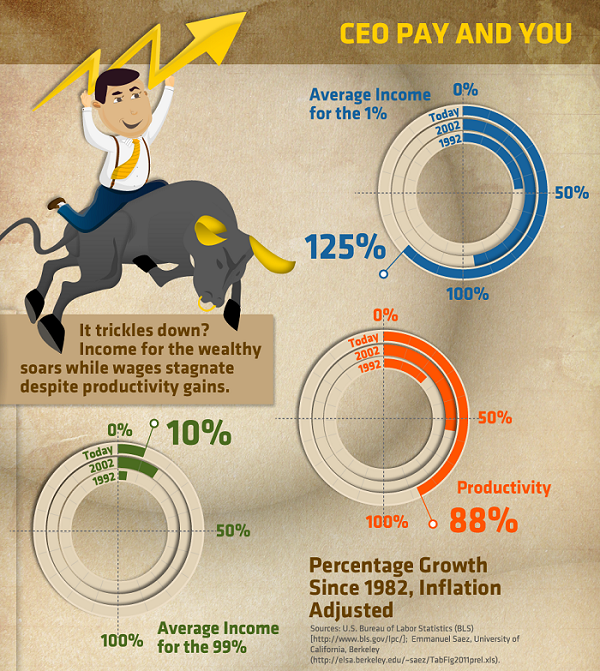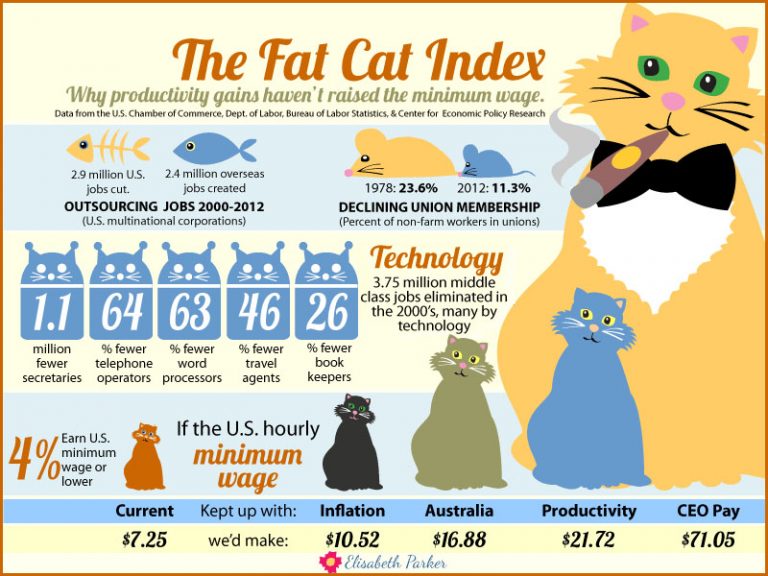.Continues from previous page.

CEO Pay and You: Infographic from the AFL-CIO with 2011 data, showing percentage growth since 1982 in: CEO Pay (125%); worker pay (10%); and worker productivity (88%). The declining federal minimum wage plays a big part in creating this problem
1. How ‘greed is good’ holds down the federal minimum wage.
Whether they’re rigging currency markets , evicting military service members from their homes , threatening layoffs if workers vote Democratic , or paying themselves lavish bonuses for running their companies into the ground , today’s CEOs take greed to a whole new level. In 1969, workers’ wages were 50.5% of the Gross Domestic Product (GDP), according toFederal Reserve Economic Research (FRED). In 2012, wages only accounted for 43.1% of the GDP.
When President Franklin Delano Roosevelt’s “ New Deal ” took hold in the 1930’s and 1940’s, the U.S. government took aKeynesian approach to economics. We invested heavily in the nation’s economy and infrastructure, and Americans a widespread prosperity unknown to previous generations. After awhile, Americans forgot about the privations of the Great Depression and World War II rationing. Some of us even started taking our new upward mobility for granted. We forgot that upward mobility depends on a federal minimum wage that keeps up with productivity and inflation.
Angry conservatives and greedy plutocrats can’t even handle abolishing slavery, let alone FDR’s New Deal. They HATE the federal minimum wage, and certainly don’t want it to keep up with productivity and inflation.
Meanwhile, the angry conservatives and greedy plutocrats who can’t even handle the abolition of slavery — let alone FDR’s New Deal — hadn’t gone away. An economically secure middle class empowered by workers’ and civil rights did not fit in with their plans. In the 1960’s, they started to fight back. On the political front, Richard M. Nixon and his fellow Republicans deployed a “ Southern Strategy ” to regain power by exploiting bigotry towards blacks (and eventually everyone else). On the intellectual front, they deployed the sociopath author/philosopher Ayn Rand and the anti-Keynesian economist Milton Friedman .
Meet the people who made selfishness and corporate greed okay.
The 1987 film, “ Wall Street ” gave birth to Ayn Rand’s and Milton Freedman’s intellectual offspring, Gordon Gekko . When this scarily realistic bond trader declared that “greed is good,” much swooning ensued. Here are the people for making selfishness and corporate greed (and federal minimum wage increase avoidance) socially acceptable:
- How Ayn Rand made individual selfishness okay: Ayn Rand wrote strangely compelling novels — including “ The Fountainhead ” (1943) and “ Atlas Shrugged ” (1957) — idealizing sociopathic heroes/rapists who relentlessly pursue their visions while ruthlessly sweeping aside the weak. By the 1960’s, she enjoyed a worshipful following, including a young and impressionable Alan Greenspan , and published “ The Virtue of Selfishness: A New Concept of Egoism ” in 1964. Freed from moral constraints, all Rand’s merry band of future plutocrats needed to do was lower the federal minimum wage, and ditch those annoying government regulations. Then they’d be free to grab more money for themselves.
- How Milton Friedman made corporate greed okay: Mid-century business executives may not have been the warmest and fuzziest of men (they were mostly men). But, according to “ The Encyclopedia of Business ,” most felt (or at least pretended to feel) a deep sense of corporate responsibility. This meant having strong ties to their employees and their communities, and striving to be good “corporate citizens.” Milton Friedman, the
evilUniversity of Chicago economist — and adviser to President Ronald Reagan — changed all that. In the late 1960s, he developed the destructive and misguided macroeconomic theories of monetarism (fight inflation at all costs!) and supply-side economics (give more money to the rich!), which led to the 2008 economic meltdown. In 1970, Friedman wrote an opinion piece in The New York Times Magazine : It declared that businesses are only responsible to their shareholders, and stakeholders can basically go to hell.
Guess who wants to ditch the federal minimum wage entirely?
So that’s how we got corporate and political leaders like Mitt Romney, Sen. Mitch McConnell (R-KY) and House Speaker John Boehner (R-OH). Like most of the GOP, they only care about rich people, and could care less about how declining incomes hurt American workers and American families. Donations from wealthy plutocrats like the Koch Brothers also explains why our Republican-led congress is in no rush to raise the federal minimum wage . It also explains why they unanimously voted against raising it in March, 2013. In fact, the notorious American Legislation Exchange Council (ALEC) even drafted legislation to repeal the federal minimum wage .
Yes, America, things can get worse. Much worse.
NEXT: Free agency.

